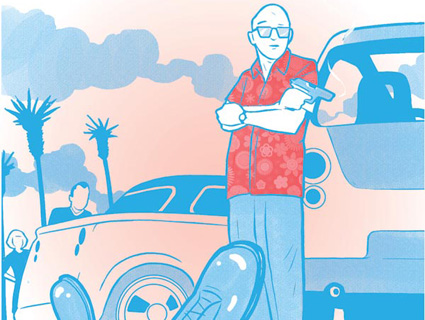The fatal shooting of Trayvon Martin in February turned a national spotlight on Florida’s “Stand Your Ground” law. Following widespread outcry about the killing—in which George Zimmerman shot the unarmed 17-year-old Martin allegedly in self defense—Florida Gov. Rick Scott convened a task force to evaluate the 2005 law. This week, the group came back with their report. Their conclusion? The controversial law is just fine as it is. But there’s just one problem: That verdict flies in the face of much troubling evidence to the contrary.
Stand Your Ground essentially makes it legal to shoot one’s way out of any situation that feels threatening: Unless law enforcement authorities can prove that’s an invalid explanation from a shooter, a resulting homicide can be deemed justifiable under the law, and the shooter is immune from criminal and civil prosecution. As Mother Jones reported in June, Florida’s Stand Your Ground law kicked off a wave of such legislation across the country, with 24 of them passed elsewhere since, thanks to much backing by the National Rifle Association and the American Legislative Exchange Council.
The evidence to date indicates it is terrible public policy. Since the spreading of the law, multiple studies have found that Stand Your Ground laws:
- don’t deter crime
- are associated with significant increases in homicides
- are racially discriminatory—homicides involving white shooters and black victims are 11 times more likely to be deemed “justifiable” than those where the scenario is reversed.
But after six months of review, it looks like Gov. Scott’s task force took little of this into account. The first recommendation in their final report is a firm endorsement of the Stand Your Ground law: “[A]ll persons have a fundamental right to stand their ground and defend themselves from attack with proportionate force in every place they have a lawful right to be and are conducting themselves in a lawful manner.”
The few recommendations for change that the report offers are vague. They recommend more training for law enforcement on the meaning of self-defense laws, that the legislature better define a shooter’s criminal immunity, and that it fund study of the correlation between Stand Your Ground laws and diversity variables, including race. (Nevermind that such studies on race already exist.)
Back when Gov. Scott announced his task force in April, Democratic state Sen. Chris Smith convened his own group to review the statute, made up almost exclusively of legal scholars, criminal defense attorneys, and law enforcement. They wrote Scott a letter detailing “the numerous and extremely problematic areas inherent in the law.”
Meanwhile, gun control advocates nationwide compiled their own data on the statute’s many flaws. “We presented them in September, we’ve mailed them to the task force, we printed them out and presented them again today,” Ginny Simmons, executive director of the Second Chance on Shoot First campaign, told the Tampa Bay Times. “They systematically decided not to review those studies.”
The task force’s report does offer some guidance on ways to better define the “unlawful activity” that can legally trigger self defense. One task force member recommended that non-criminal activity be exempt, such as traffic infractions. Another suggested the definition “should include temporal proximity of the unlawful activity to the use of force.” But these points seem thunderingly obvious: Of course there shouldn’t be a law on the books that permits shooting a person who is making an illegal left turn, or who committed a crime hours ago. This guidance reads like an attempt to deflect discussion from the serious pitfalls of the law.
The task force has until March to make its final recommendations to the Florida legislature, but anything majorly different from this week’s report seems unlikely: The state’s incoming House speaker has already said he’ll oppose watering down the current version.
















